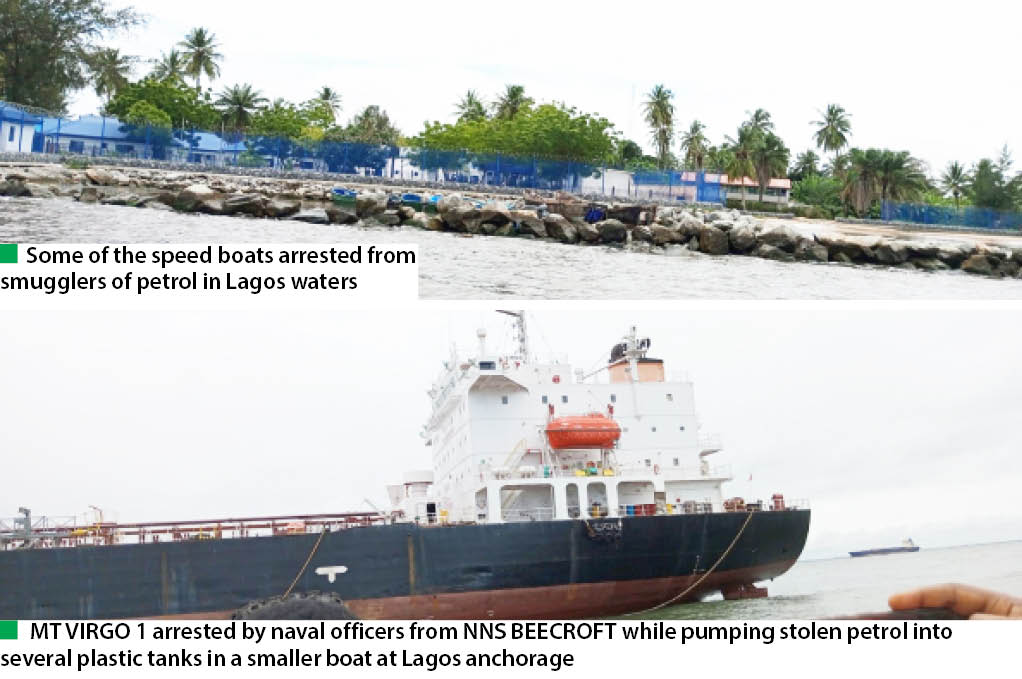Nearly four months after President Bola Ahmed Tinubu declared an end to the subsidy regime, which is meant to crush corruption and organized crime in the nation’s oil and gas sector, smuggling of petrol is currently on the rise.
Smugglers of petrol have intensified their methods, sailing deep into the sea to ferry stolen products to neighbouring countries.
The smugglers have also mapped out effective and efficient routes in bushes and creeks to cross the land borders, carrying petrol in several small plastic bottles and large cellophane bags into Benin Republic.
Presently, the business has become an all comers affairs as Beninese have also joined the bandwagon of petrol thieves around Badagry, Owode Akpa and Idiroko areas in Lagos and Ogun states.
Badagry roundabout is usually monster point for smugglers of petrol who wait around this area for commercial vehicles that would convey their products to Seme.
- Do You Have The Right Answers To Questions About Nigeria? (Check this out)
- Relocate Kano A/Court sitting to Abuja, NJC urged
Hardly would a cab drive through the long stretch of road from Badagry to Seme without carrying petrol in small plastics bottles and cellophane bags.
Security operatives at the border post are not left out as they are now complicit in the fuel smuggling ring.
At night, security operatives use their vehicles to move the items hidden in different parts of their vehicles to villages along the border corridors.
Those on check points collect between N100 and N200 to allow them go freely, making it attractive for all manner of security to man illegal check points along the corridor.
Recently, at the Nigerian Shippers’ Council, members of the ECOWAS Commission said they counted over 57 such illegal checkpoints along the Seme-Badagry corridor.
In fact, earlier in September 2023, the authority in charge of the Seme Command of the Nigeria Customs Service said it intercepted about 13 tankers load of petrol allegedly being smuggled to the Benin Republic by criminal gangs.
The large shipment would have dealt a fatal blow to the nation’s economy if not intercepted.
Former Controller in charge of Seme Command of the Nigeria Customs Service, Dera Nnadi, while displaying some of the seized petrol stored in jerry cans, said the die-hard criminals are never tired but that officers of the Service will continue to deal fatal blow to their finances.
Similarly, the Federal Operations Unit (FOU) Zone A said it also intercepted 1,236 jerry cans by 25 litres (30,900 litres) of petrol in Lagos and Ogun states.
Acting Controller of the Unit, Hussein Kehinde Ejibunu, said the items were intercepted at different times and locations within border corridors of the South-West Zone.
But stakeholders in border towns in the South-West region believe that the removal of petrol subsidy, the free fall of the naira, and the closure of some filling stations close to the border led people to risk their lives filling plastic containers, moving same across the Nigerian border to Benin Republic where it’s sold at a much higher price.
Currently, as a result of the free fall of the naira, 1000 CFA is now about N1380, making the business of smuggling still lucrative, despite the risk.
The stakeholders believe that despite the seizures of the products by Customs officers, the smugglers recover over ten times what they may have lost in a single trip, if successful.
However, the Nigeria Customs Service and the Nigerian Navy have tightened areas where criminal gangs and other thieves used to siphon stolen fuel worth billions of dollars.
At first, the removal of subsidy on May 29 caused delivery delays and long lines at stations, threatening to cripple the economy, if shortages persist. It also affected supply of the product by smugglers to Benin Republic as a result of the sudden increase in the pump price by the Bola Ahmed Tinubu-led federal government m
Not worried by the outcry by organized labour, Tinubu promised to root out endemic corruption and strengthen the nation’s ailing refineries.
Why is there so much fuel theft in Nigeria?
Comptroller General of the Nigeria Customs Service, Adewale Adeniyi, had on Monday July 10, 2023, vowed to clamp down on oil thieves, insisting that the nation cannot afford to let saboteurs take over the nation’s economy.
Adeniyi said there were still cases of smuggling of petrol at Nigeria’s border stations despite the removal of subsidy on the commodity, but that the Service had adopted new measures.
This is coming at a time the National Petroleum Company Limited said it intercepted a suspected Cameroon-bound vessel with a cargo of oil on board.
Daily Trust investigation revealed that smuggling of fuel has become a juicy target for both local and international thieves and Nigeria is now the biggest spot in the entire continent, going by the frequency of seizures by the Navy and Customs.
The present state of insecurity in the country and complicity on the part of villagers in border towns and riverine communities have allowed organized groups to open clandestine taps on major pipelines.
An unconfirmed report also alleged internal complicity at the refineries, terminals and depots, who they accused of allegedly opening their doors for theft of the product.
In August this year, the Nigerian Navy Ship, NNS BEECROFT, said it thwarted an illegal bunkering activities and arrested seven suspects.
Commander NNS BEECROFT, Commodore Kolawole Oguntuga, said the suspects, mainly Beninese, were arrested on board a Motor Tanker, MT VIRGO 1.
He said the suspects were arrested with two wooden boats while transferring petrol from the vessel into hundreds of 209 litres drums and 50 litres Jerry cans.
He said the suspects were nabbed around Lagos anchorage while trying to transfer the products from the foreign flag vessel to the drums under the cover of darkness.
The rising price of petrol in neighbouring countries, occasioned by the depreciation in the value of the naira, makes Nigeria a juicy target for petrol thieves. Petrol stolen from Nigeria is the biggest among countries in the West Africa sub-region.
These countries depend on cheap refined products smuggled across the nation’s porous borders.
Fuel stolen from NNPC infrastructure mostly ends in the hands of the same retailers.
How did fuel theft start in Nigeria?
A Special Investigative Panel on oil theft loses in Nigeria had earlier in the year submitted to a former National Security Adviser (NSA), Maj-Gen. Babagana Mongono, a report which attributed the causes of crude oil racketeering to lack of proper reporting of crude oil production, illegal refining, theft from wellheads.
According to Wikipedia, oil theft in Nigeria is facilitated by the pragmatic cooperation between security forces, militia organizations, oil company employees, and the local population who, it said, use variety of methods to steal oil from the multinational oil corporations that are stationed within the country. Exxon Mobil, Chevron, Equinor, Shell and Agio are known as the five largest multinational oil companies presently in Nigeria.
It said that due to the lack of federal oversight and large network of corruption, oil theft is primarily cellular rather than hierarchical and requires frequent collaboration between variety of random players depending on the level of oil theft being committed.
However, fuel theft has been a problem in Nigeria for decades but it has been growing in recent years.
It has also escalated in recent years following reforms to the country’s oil sector by government.
Government has liberalized the industry for foreign investment. In turn, retail prices rose, giving cartels an opportunity to undercut those prices through black-market sales of products.
Why is Nigeria not producing enough petrol?
For years, NNPC’s three oil refineries have operated well below their capacity, due to multiple reasons which includes deferred maintenance.
It is no news that Nigeria has been grappling with challenges to refine its crude oil domestically over some decades.
Despite being Africa’s leading oil producer, Nigeria faces a myriad of challenges to take advantage of its endowed natural resources like other OPEC members such as Saudi Arabia. Many Nigerians are still in abject poverty and significant numbers (about 33 percent) are unemployed. Many wonder if these natural resources are a blessing or a curse.
Data from OPEC shows that Nigeria is the only OPEC member with the lowest refining capacity utilization for many years now. In fact, as at 2021, Nigeria refines only about 5,000 barrel/day, equivalent to 1 percent of total refining capacity.
This is despite the Federal Government’s nameplate refinery capacity of 445,000 barrel per day(bpd).
Despite being among the top oil producer in the world, Nigeria has consistently failed to reap the benefit of this resource due to high level of corruption, oil sabotage, pipeline vandalism, oil theft, violence, among others.
Successive governments have reportedly spent significant amounts of Naira to rehabilitate, operate and maintain the refineries with no result. About N1.5 trillion was reportedly spent on non-operational refineries between 2015 to 2020, averaging N264bn annually. Yet, many Nigerians lack access to unhindered supply of fuel and experience hike in fuel price, despite fuel subsidy.
The reason for the supply crunch and price hikes is clear. As oil rich as Nigeria is, its refineries are not functioning optimally despite having a nameplate refining capacity that exceeds demand.
Most of these refineries were built decades ago. Mismanagement, aging infrastructure, outlived equipment, operational inefficiency, are amongst the cause of the woes. Needless to say, corruption and diversion of money allocated for maintenance are also a big factor.




